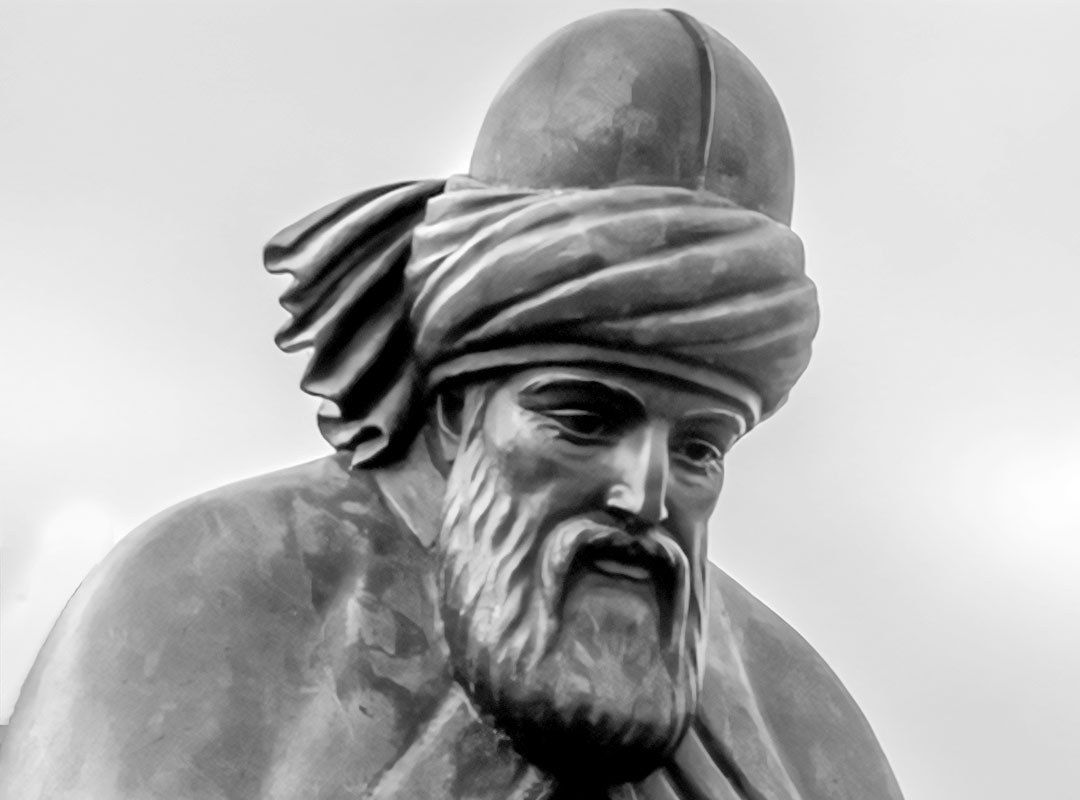Carolyn Mary Kleefeld – Contact Us
Please fill out form as completely as possible so we can contact you regarding your request.

I began reading Rumi’s mystical poetry in the late 1990s when I first encountered a translation of his work by Coleman Barks, and he is someone that both Carolyn and I have been deeply inspired.
Jalāl al-Dīn Muḥammad Rūmī was a 13th Century Sufi mystic and Persian poet, who lived from 1207 to 1273. His poems have been widely translated into many languages, and he is one of the most popular and bestselling poets in the U.S.
Rumi was born to Persian-speaking parents, originally from the Balkh, which is now in Afghanistan. Rumi’s birthplace isn’t known for certain; scholars think that he was either born in Wakhsh, a village on the Vakhsh River in present-day Tajikistan or in the city of Balkh, which is in present-day Afghanistan. Rumi’s father was an eccentric Muslim teacher— a theologian, jurist, and mystic— who had a great influence on his son’s development.
When he was five years old, a young Rumi reportedly saw angels. Scholars have to tease apart legend from historical fact about Rumi’s past, but it is known that at the age of twenty-five, Rumi inherited the position of an Islamic teacher, when his father, the previous holder of the position, died.
For nine years, Rumi practiced Sufism as a disciple of Burhan ud-Din, and he became an Islamic Jurist, issuing legal rulings and giving sermons in the mosques of Konya. (Sufism is a branch of Islam that sees the religious practice as a means to oneness with God, and Sufis have traditionally infused their devotion with poetry and music.)
Rumi was known for his personal charm, as well as his great religious knowledge, and he brought musical instruments into prayer and practiced a whirling dance, that he believed helped the human soul to connect with the divine.
In 1244 Rumi met a member of the Sufi religious order named Shams-e Tabrizi (who had taken vows of poverty and austerity) that completely changed his life, and he became an ascetic.
Then, one fateful night in 1248, as Rumi and Shams were talking, Shams answered a mysterious knock at the back door. Shams went out the door and was never seen again. It was thought that he was murdered, and Rumi’s love for, and his bereavement over the death of Shams was expressed in a creative outpouring of lyric poems, known as the Divan-e Shams-e Tabrizi, and this is when Rumi began to seriously write poetry.
Rumi went on to write over 3,000 lyrical, rhymed poems called “ghazals,” and over 2,000 four-line rhyming poems called “robaiyat,” which often deal with themes of love and mystical union with God. Although his works were written mostly in Persian, he sometimes also wrote in Greek, Turkish, and Arabic.
In December 1273, Rumi fell ill, predicted his own death, and composed one final poem. He gave his followers special instructions to treat the night of his death like they would “a joyous wedding night,” and he planned his own funeral, with singers, musicians, and dancers. Rumi’s body was entombed beside that of his father, and a shrine was erected over his place of burial.
Rumi’s epitaph reads:
“When we are dead, seek not our tomb in the earth, but find it in the hearts of men.”
Rumi’s work lives on and many people know his quotes from memes commonly passed around Facebook and Instagram, as his spiritual wisdom transcends culture, religion, and time. Some of the quotes that Rumi is remembered for include:
You are not a drop in the ocean. You are the entire ocean, in a drop.
Raise your words, not voice. It is rain that grows flowers, not thunder.
This place is a dream. Only a sleeper considers it real. Then death comes like dawn, and you wake up laughing at what you thought was your grief.
As you start to walk on the way, the way appears.
What hurts you, blesses you. Darkness is your candle.
There’s a field somewhere beyond all doubt and wrongdoing. I’ll meet you there.